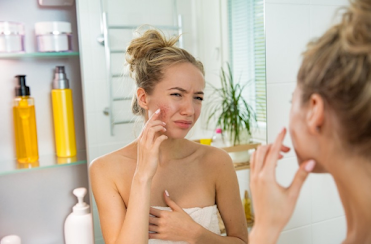What's Acne And How It Happens
Are you fed up with battling persistent breakouts? Acne can be a source of frustration, but comprehending its roots and mastering effective management techniques can make a world of difference. At Your Sanctuary, we're committed to arming you with the knowledge and resources necessary for achieving clearer, healthier skin. Let's delve into the realm of acne, understanding its triggers and adopting strategies to reclaim control of your skincare journey.
Unveiling Acne
Acne is a prevalent skin condition arising from the blockage of hair follicles by a combination of oil and dead skin cells. This blockage often manifests as pimples, blackheads, whiteheads, and in severe cases, cysts and nodules. While commonly associated with adolescence, acne can affect individuals of all ages and skin types.
Understanding the Causes
Excess Sebum Production: Overactive sebaceous glands can produce an excess of oil, known as sebum. When this surplus mixes with dead skin cells, it obstructs pores, paving the way for acne breakouts.
Proliferation of Bacteria: The skin harbors various bacteria, including Propionibacterium acnes (P. acnes). When trapped oil and dead skin cells accumulate within pores, it creates an environment conducive to bacterial growth, leading to inflammation and acne.
Hormonal Fluctuations: Changes in hormone levels, such as those experienced during puberty, menstruation, pregnancy, or due to certain medical conditions, can influence sebaceous gland activity, exacerbating acne.
Genetic Predisposition: Genetics play a significant role in determining an individual's susceptibility to acne. Those with a family history of acne are more likely to develop the condition themselves.
Impact of Diet and Lifestyle: While diet alone doesn't directly cause acne, certain dietary choices and lifestyle factors can aggravate existing acne or contribute to its development. High-glycemic foods, dairy products, and stress have been implicated in acne flare-ups.
Managing Acne: Strategies for Success
Establish a Consistent Skincare Routine: Regular cleansing with a gentle cleanser helps remove excess oil, dirt, and impurities without stripping the skin's natural moisture. Follow up with a non-comedogenic moisturizer to keep your skin hydrated.
Select Non-Comedogenic Products: Choose skincare and makeup products labeled as non-comedogenic, indicating they won't clog pores. This can help prevent acne breakouts and minimize exacerbation of existing acne.
Avoid Picking or Popping Pimples: Resist the temptation to pick or pop pimples, as this can worsen inflammation, increase scarring, and spread bacteria, leading to further breakouts. Allow pimples to heal naturally.
Consider Over-the-Counter Treatments: Over-the-counter acne treatments containing ingredients like benzoyl peroxide, salicylic acid, or sulfur can help regulate oil production, unclog pores, and reduce inflammation. Consistency is key, as results may take time to manifest.
Seek Professional Guidance if Necessary: If over-the-counter treatments prove ineffective or if you experience severe or persistent breakouts, consulting a dermatologist is advisable. A dermatologist can evaluate your skin, offer personalized treatment recommendations, and prescribe medications if needed.
Conclusion
Acne can significantly impact self-esteem and quality of life, but armed with knowledge and effective skincare strategies, you can regain control of your skin health. At Your Sanctuary, we're dedicated to supporting you on your journey to radiant, blemish-free skin.
Originally published on : https://www.yoursanctuary.com.au/whats-acne-and-how-it-happens/


Comments
Post a Comment